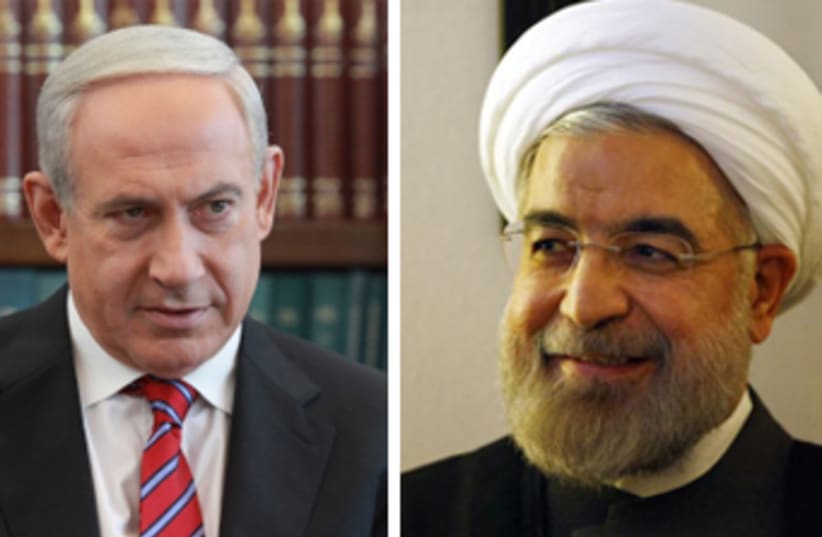The world must not be duped by Iranian President Hassan Rouhani’s soft words and pleasant smiles, Prime Minister Binyamin Netanyahu and President Shimon Peres said in Davos, Switzerland, on Thursday, soon after Rouhani launched the second phase of his charm offensive at the World Economics Forum.“Rouhani can say something, but it doesn’t make it real,” Netanyahu said of the Iranian leader’s claims not to want nuclear weapons and his expressed opposition to foreign intervention in Syria. “It sounds nice, but it is false.”The Iranian’s conciliatory words “have no connection to what is going on on the ground,” the prime minister said.
Rouhani, who fascinated much of the international community during his first major address to the international community at the UN General Assembly in September, was given another prestigious stage and the legitimization it confers, and he took the opportunity to appeal to the world’s business leaders in Davos to invest in his country.Iran was determined to negotiate a comprehensive deal on its nuclear program in order to develop its battered economy, he said.Rouhani stressed his commitment to achieving a final settlement. “Iran has a serious will to come to an agreement with the P5+1 [powers],” he told the assembled business and political leaders. “I do not see a serious impediment in the way of this agreement. The Iranian will is strong.”Asked what might prevent a long-term settlement, he cited the risk of “pressure from other parties” – a veiled reference to Israel, which denounced the interim deal that went into effect on Monday as a “historic mistake.”Rouhani promised to pursue a consistent foreign policy of “prudence and moderation” to revive his nation’s economy.He called for cooperation with all of Iran’s neighbors, but did not mention Gulf rival Saudi Arabia by name, and refused, when pressed twice, to include Israel among states with which Iran sought friendly relations.Netanyahu addressed the forum some four hours after Rouhani, and in his prepared remarks steered clear of any reference to Rouhani, addressing Iran only when former Norwegian foreign minister Espen Barth Eide, who moderated the session, asked him about the shifting Middle East.Netanyahu said many countries in the Arab world were “not reassured” by Rouhani’s speech.“Believe me, they get it,” the prime minister said.“There is a change of words without a change in deeds.”According to Netanyahu, many in the Arab world understand that Tehran “remains aggressive, supports terror, participates in the slaughter in Syria, and is pursuing the development of ballistic missiles and plutonium for nuclear weapons.They get it right, and we get it right. We all wish there was a real change in Iran; we don’t see that. We have to look at their deeds, not the soft words they utter.”Peres, who will be feted at a special session at the conference on Friday, held a press conference after Rouhani’s speech to respond to the Iranian leader.“The most significant remarks were the ones he didn’t make – he didn’t express support for peace in the Middle East,” Peres said.“He is the only leader I know who didn’t say clearly the time has come to make peace between Israel and the Arabs.He excluded the reference to peace, and when he was asked if his vision included all countries he said it included only the ones that Iran will accept. That is some definition.”Netanyahu, who is scheduled to meet with US Secretary of State John Kerry on the sidelines of the conference on Friday, said during his address that investment in Israel was good not only for Israel and those doing business in Israel, but “also for peace.”“An investment in the economic peace assists the development of political peace,” he said. “It could be of great benefit to all our neighbors, but especially to the Palestinians, because we’ve had some beginnings of cooperation, including in the hi-tech field, between Israeli entrepreneurs and Palestinian entrepreneurs.”The prime minister presented Israel as the “innovation nation,” and listed a number of reasons for its success in innovation and technology: the synergy between the defense and civilian sectors; the country’s excellent universities; the Jewish emphasis on knowledge; the country’s small size that encourages close cooperation; and the fact that it had to innovate throughout its history to survive.“Israel is not what’s wrong with the Middle East,” Netanyahu said, calling this a “great misperception” that he wanted to correct. Rather, “Israel is what’s right in the Middle East.“The future belongs to those who innovate,” he said.“Israel is a great seller of innovation. This is an invitation to the innovation nation. Israel is open for business; it’s open for your business.”Earlier in the day, Netanyahu participated in a session on global information technology.Some of the world’s business leaders were in attendance, including CISCO chairman and CEO John Chambers, Hewlett-Packard director Anne Livermore and Qualcomm chairman and CEO Dr. Paul Jacobs.He also met with Australia’s Prime Minister Tony Abbott, Nigeria’s President Goodluck Jonathan, new Norwegian Prime Minister Erna Solberg and a delegation of Republican US congressmen led by House Majority Leader Eric Cantor.Abbott, according to a statement put out by Netanyahu’s office, emphasized the closeness between Australia and Israel, and said that with the exception of Israel, Australia was the only country in the world where Jews have served in the positions of head of state, president of the Supreme Court and commander of the army.Reuters contributed to this report.Netanyahu: Rouhani continues trying to fool the world
PM says goal of the "regime of the ayatollahs hiding behind Rouhani's smiles" is to ease sanctions without giving up nukes.
